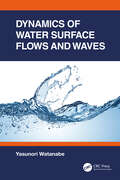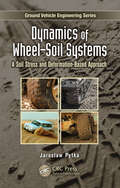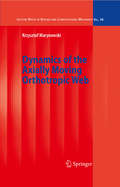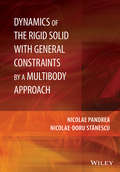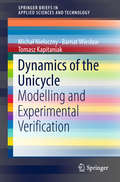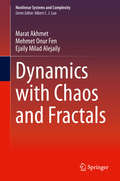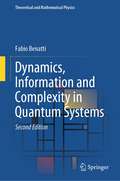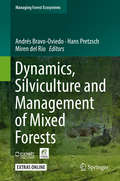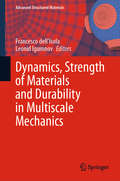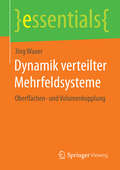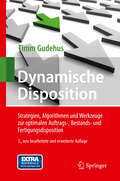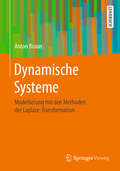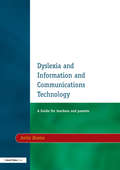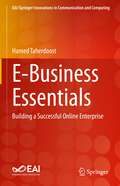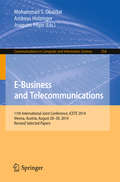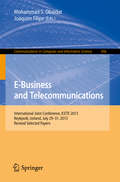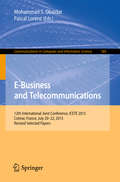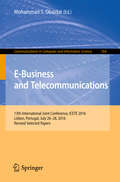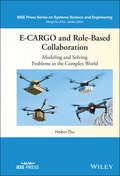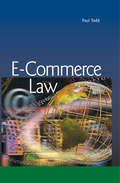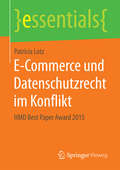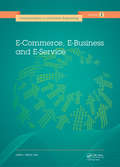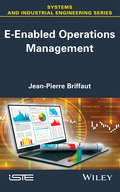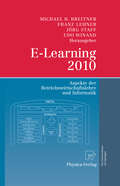- Table View
- List View
Dynamics of Water Surface Flows and Waves
by Yasunori WatanabeDynamics of Water Surface Flows and Waves provides theoretical descriptions of the whole life of water surface waves through their birth, propagation, evolution and finally breaking. While initial capillary waves are created via instability at air-water interfaces, potential wave theories adequately describe interactions of waves with current, bathymetry and structure. In the final breaking stage, potential fluid motions in the waves rapidly evolve into vortical turbulent flows that disturb the surfaces, resulting in entrainment of air-bubbles and ejection of sea spray in bursting bubbles floating on the surface. All theories and analytical methods required to understand the series of wave processes, over diverse areas of subjects, including turbulence, diffusion, vortex and capillary dynamics, shallow water approach, and stability analysis, as well as the conventional potential wave theory, are comprehensively covered in this book. All of the mathematical formulas are consistently developed from theorems and linked with physics, which provides theoretical understanding and further interest in wave dynamics. This is an ideal graduate-level textbook or reference for engineers and researchers in the fields of fluid and wave mechanics, coastal and ocean engineering.
Dynamics of Wheel-Soil Systems: A Soil Stress and Deformation-Based Approach (Ground Vehicle Engineering)
by Jaroslaw A. PytkaWhy is knowledge of soil stress and deformation state important for off-road locomotion? How do you measure soil stress and deformation under wheel loads? What are the actual values of stresses and deformation in soil or snow under a passing wheel? Providing answers to these questions and more, Dynamics of Wheel-Soil Systems: A Soil Stress and Defo
Dynamics of the Axially Moving Orthotropic Web
by Krzysztof MarynowskiA material continuum moving axially at high speed can be met in numerous different technical applications. These comprise band saws, web papers during manufacturing, processing and printing processes, textile bands during manufacturing and processing, pipes transporting fluids, transmission belts as well as flat objects moving at high speeds in space. In all these so varied technical applications, the maximum transport speed or the transportation speed is aimed at in order to increase efficiency and optimize investment and performance costs of sometimes very expensive and complex machines and installations. The dynamic behavior of axially moving systems very often hinders from reaching these aims. The book is devoted to dynamics of axially moving material objects of low flexural stiffness that are referred to as webs. Webs are moving at high speed, for example, in paper production the paper webs are transported with longitudinal speeds of up to 3000 m/min. Above the critical speed one can expect various dynamical instabilities mainly of divergent and flutter type. The up-to-date state of investigations conducted in the field of the axially moving system dynamics is presented in the beginning of the book. Special attention is paid on nonlinear dynamic investigations of translating systems. In the next chapters various mathematical models that can be employed in dynamic investigations of such objects and the results of analysis of the dynamic behavior of the axially moving orthotropic material web are presented. To make tracing the dynamic considerations easier, a paper web is the main object of investigations in the book.
Dynamics of the Rigid Solid with General Constraints by a Multibody Approach
by Nicolae Pandrea Nicolae-Doru StanescuCovers both holonomic and non-holonomic constraints in a study of the mechanics of the constrained rigid body. Covers all types of general constraints applicable to the solid rigid Performs calculations in matrix form Provides algorithms for the numerical calculations for each type of constraint Includes solved numerical examples Accompanied by a website hosting programs
Dynamics of the Unicycle: Modelling And Experimental Verification (SpringerBriefs in Applied Sciences and Technology)
by Tomasz Kapitaniak Michał Niełaczny Barnat WiesławThis book presents a three-dimensional model of the complete unicycle–unicyclist system. A unicycle with a unicyclist on it represents a very complex system. It combines Mechanics, Biomechanics and Control Theory into the system, and is impressive in both its simplicity and improbability. Even more amazing is the fact that most unicyclists don’t know that what they’re doing is, according to science, impossible – just like bumblebees theoretically shouldn’t be able to fly. This book is devoted to the problem of modeling and controlling a 3D dynamical system consisting of a single-wheeled vehicle, namely a unicycle and the cyclist (unicyclist) riding it. The equations of motion are derived with the aid of the rarely used Boltzmann–Hamel Equations in Matrix Form, which are based on quasi-velocities. The Matrix Form allows Hamel coefficients to be automatically generated, and eliminates all the difficulties associated with determining these quantities. The equations of motion are solved by means of Wolfram Mathematica. To more faithfully represent the unicyclist as part of the model, the model is extended according to the main principles of biomechanics. The impact of the pneumatic tire is investigated using the Pacejka Magic Formula model including experimental determination of the stiffness coefficient. The aim of control is to maintain the unicycle–unicyclist system in an unstable equilibrium around a given angular position. The control system, based on LQ Regulator, is applied in Wolfram Mathematica. Lastly, experimental validation, 3D motion capture using software OptiTrack – Motive:Body and high-speed cameras are employed to test the model’s legitimacy. The description of the unicycle–unicyclist system dynamical model, simulation results, and experimental validation are all presented in detail.
Dynamics with Chaos and Fractals (Nonlinear Systems and Complexity #29)
by Marat Akhmet Mehmet Onur Fen Ejaily Milad AlejailyThe book is concerned with the concepts of chaos and fractals, which are within the scopes of dynamical systems, geometry, measure theory, topology, and numerical analysis during the last several decades. It is revealed that a special kind of Poisson stable point, which we call an unpredictable point, gives rise to the existence of chaos in the quasi-minimal set. This is the first time in the literature that the description of chaos is initiated from a single motion. Chaos is now placed on the line of oscillations, and therefore, it is a subject of study in the framework of the theories of dynamical systems and differential equations, as in this book. The techniques introduced in the book make it possible to develop continuous and discrete dynamics which admit fractals as points of trajectories as well as orbits themselves. To provide strong arguments for the genericity of chaos in the real and abstract universe, the concept of abstract similarity is suggested.
Dynamics with Chaos and Fractals (Nonlinear Systems and Complexity #29)
by Marat Akhmet Mehmet Onur Fen Ejaily Milad AlejailyThe book is concerned with the concepts of chaos and fractals, which are within the scopes of dynamical systems, geometry, measure theory, topology, and numerical analysis during the last several decades. It is revealed that a special kind of Poisson stable point, which we call an unpredictable point, gives rise to the existence of chaos in the quasi-minimal set. This is the first time in the literature that the description of chaos is initiated from a single motion. Chaos is now placed on the line of oscillations, and therefore, it is a subject of study in the framework of the theories of dynamical systems and differential equations, as in this book. The techniques introduced in the book make it possible to develop continuous and discrete dynamics which admit fractals as points of trajectories as well as orbits themselves. To provide strong arguments for the genericity of chaos in the real and abstract universe, the concept of abstract similarity is suggested.
Dynamics, Information and Complexity in Quantum Systems (Theoretical and Mathematical Physics)
by Fabio BenattiThis second edition of Dynamics, Information and Complexity in Quantum Systems widens its scope by focussing more on the dynamics of quantum correlations and information in microscopic and mesoscopic systems, and their use for metrological and machine learning purposes. The book is divided into three parts: Part One: Classical Dynamical SystemsAddresses classical dynamical systems, classical dynamical entropy, and classical algorithmic complexity.Includes a survey of the theory of simple perceptrons and their storage capacity. Part Two: Quantum Dynamical SystemsFocuses on the dynamics of entanglement under dissipative dynamics and its metrological use in finite level quantum systems.Discusses the quantum fluctuation approach to large-scale mesoscopic systems and their emergent dynamics in quantum systems with infinitely many degrees of freedom.Introduces a model of quantum perceptron whose storage capacity is computed and compared with the classical one. Part Three: Quantum Dynamical Entropies and ComplexitiesDevoted to quantum dynamical entropies and algorithmic complexities. This book is meant for advanced students, young and senior researchers working in the fields of quantum statistical mechanics, quantum information, and quantum dynamical systems. It is self-contained, and the only prerequisites needed are a standard knowledge of statistical mechanics, quantum mechanics, and linear operators on Hilbert spaces.
Dynamics, Silviculture and Management of Mixed Forests (Managing Forest Ecosystems #31)
by Hans Pretzsch Andrés Bravo-Oviedo Miren Del RíoThe capacity of mixed forests to mitigate climate change effects by increasing resilience and lowering risks is pinpointed as an opportunity to highlight the role of tree species rich forests as part of complex socio-ecological systems. This book updates and presents the state-of-the-art of mixed forest performance in terms of regeneration, growth, yield and delivery of ecosystem services. Examples from more than 20 countries in Europe, North Africa and South America provide insights on the interplay between structure and functionining, stability, silviculture and optimization of management of this type of forests. The book also analyses the role of natural mixed forests and mixed plantations in the delivery of ecosystem services and the best modelling strategy to study mixed forest dynamics. The book is intended to serve as a reference tool for students, researchers and professionals concerned about the management of mixed forests in a context of social and environmental change.
Dynamics, Strength of Materials and Durability in Multiscale Mechanics (Advanced Structured Materials #137)
by Francesco Dell’Isola Leonid IgumnovThis book reviews the mathematical modeling and experimental study of systems involving two or more different length scales. The effects of phenomena occurring at the lower length scales on the behavior at higher scales are of intrinsic scientific interest, but can also be very effectively used to determine the behavior at higher length scales or at the macro-level. Efforts to exploit this micro- and macro-coupling are, naturally, being pursued with regard to every aspect of mechanical phenomena. This book focuses on the changes imposed on the dynamics, strength of materials and durability of mechanical systems by related multiscale phenomena. In particular, it addresses: 1: the impacts of effective dissipation due to kinetic energy trapped at lower scales 2: wave propagation in generalized continua 3: nonlinear phenomena in metamaterials 4: the formalization of more general models to describe the exotic behavior of meta-materials 5: the design and study of microstructures aimed at increasing the toughness and durability of novel materials
Dynamik verteilter Mehrfeldsysteme: Oberflächen- und Volumenkopplung (essentials)
by Jörg WauerAnhand von ausführlich durchgerechneten Anwendungsbeispielen stellt Jörg Wauer Forschungsergebnisse zum Thema Mehrfeldsysteme mit Oberflächen- und Volumenkopplung prägnant dar und liefert so einen Einblick auf interdisziplinäre dynamische Systeme der Physik mit verteilten Parametern. Damit zeigt der Autor erstmalig eine wissenschaftlich exakte Behandlung und Diskussion des Themas Dynamik verteilter Mehrfeldsysteme.
Dynamische Disposition
by Timm GudehusDie dynamische Disposition ermöglicht marktgerechte Lieferzeiten und kostenoptimale Lieferfähigkeit, sie verhindert überhöhte oder unzureichende Bestände. In dem Buch werden Strategien, Algorithmen und Verfahren der dynamischen Auftrags-, Bestands- und Fertigungsdisposition allgemein verständlich beschrieben und anhand von Beispielen demonstriert. Mithilfe des Regelwerks kann die dynamische Disposition in allen Branchen organisiert und implementiert werden. Die erweiterte 3. Auflage zeigt Potenziale für Serviceverbesserung und Kosteneinsparung auf.
Dynamische Systeme: Modellierung mit den Methoden der Laplace-Transformation
by Anton BraunIm Zug der Analyse dynamischer Systeme sind fundierte Kenntnisse der relevanten physikalischen Gesetzmäßigkeiten von zentraler Bedeutung, die in diesem Buch für mechanische, elektrische sowie für mechatronische Elemente erschöpfend behandelt werden. Darüber hinaus braucht der Anwender ein erhebliches Maß an mathematischen Grundlagen, insbesondere der Laplace-Transformation, die sich vor allem im Rahmen der Simulation und der Analyse technischer Systeme bestens bewährt hat. Nicht zuletzt deshalb wird diesem Bereich der Mathematik an Hand einer Fülle von Beispielen große Priorität beigemessen. Im Rahmen der Untersuchung komplexerer Anlagen treten häufig so genannte Mehrgrößensysteme auf, die in dieser Arbeit mit den Methoden des Zustandsraums erschöpfend behandelt werden. Schließlich muss vor jeder Inbetriebnahme aktiver Systeme, insbesondere von Regelkreisen, deren Stabilität unter allen Umständen gewährleistet sein. Deshalb wird in diesem Buch der Beurteilung der Stabilität von Systemen an Hand diverser Stabilitätskriterien ein separates Kapitel gewidmet.
Dyslexia and Information and Communications Technology: A Guide for Teachers and Parents
by Anita KeatesEffective use of ICT can enhance many dyslexic pupils' access to the curriculum, but it has to be used appropriately. This book will be useful to all teachers, teaching assistants, SENCOs and parents who are keen to have practical advice on how to help a child in this way. Full of strategies and suggestions that are based on the author's extensive classroom experience, this accessible book is suitable for the ICT novice and more advanced user alike. The book has been fully updated to guide the user through the maze of hardware and software currently available, identifying those most suitable for different Key Stages and curriculum subjects as well as providing ICT solutions to the problems of assessing and screening for dyslexia.
E-Business Essentials: Building a Successful Online Enterprise (EAI/Springer Innovations in Communication and Computing)
by Hamed TaherdoostThis textbook presents comprehensive treatment of the e-business environment and the tools and strategies necessary for success in the digital realm. The author covers a wide range of e-business-related topics, such as e-environment, e-business security, billing and payment systems, supply chain management, digital marketing, customer relationship management, business intelligence, e-business adoption, change management, performance measurement, legal, and regulatory. The book focuses on the ethical and legal issues of e-business and offers practical advice for establishing and maintaining successful e-business operations. The book also discusses the challenges of keeping up with swiftly evolving technology and the ever-changing internet landscape, including online transactions, data security, and administration. The author seeks to advance e-business research and practice by providing a comprehensive and up-to-date overview of the field. The author includes case studies that span various industries and companies, from small startups to large corporations, providing readers with a diverse and practical perspective on e-business.
E-Business and Telecommunications
by Mohammad S. Obaidat Andreas Holzinger Joaquim FilipeThis book constitutes the refereed proceedings of the 11th International Joint Conference on E-Business and Telecommunications, ICETE 2014, held in Vienna, Austria, in August 2014. ICETE is a joint international conference integrating four major areas of knowledge that are divided into six corresponding conferences: International Conference on Data Communication Networking, DCNET; International Conference on E-Business, ICE-B; International Conference on Optical Communication Systems, OPTICS; International Conference on Security and Cryptography, SECRYPT; International Conference on Wireless Information Systems, WINSYS; and International Conference on Signal Processing and Multimedia, SIGMAP. The 27 full papers presented were carefully reviewed and selected from 328 submissions. The papers cover the following key areas of e-business and telecommunications: data communication networking; e-business; optical communication systems; security and cryptography; signal processing and multimedia applications; wireless information networks and systems.
E-Business and Telecommunications
by Mohammad S. Obaidat Joaquim FilipeThis book constitutes the refereed proceedings of the 9th International Joint Conference on E-Business and Telecommunications, ICETE 2012, held in Rome, Italy, in July 2012. ICETE is a joint international conference integrating four major areas of knowledge that are divided into six corresponding conferences: International Conference on Data Communication Networking, DCNET; International Conference on E-Business, ICE-B; International Conference on Optical Communication Systems, OPTICS; International Conference on Security and Cryptography, SECRYPT; International Conference on Wireless Information Systems, WINSYS; and International Conference on Signal Processing and Multimedia, SIGMAP. The 18 full papers presented were carefully reviewed and selected from 403 submissions. They cover a wide range of topics in the key areas of e-business and telecommunications.
E-Business and Telecommunications
by Mohammad S. Obaidat Pascal LorenzThis bookconstitutes the refereed proceedings of the 12th International Joint Conferenceon E-Business and Telecommunications, ICETE 2015, held in Colmar, France, inJuly 2015. ICETE is a joint international conference integrating four majorareas of knowledge that are divided into six corresponding conferences:International Conference on Data Communication Networking, DCNET; InternationalConference on E-Business, ICE-B; International Conference on OpticalCommunication Systems, OPTICS; International Conference on Security andCryptography, SECRYPT; International Conference on Wireless InformationSystems, WINSYS; and International Conference on Signal Processing andMultimedia, SIGMAP. The 23 fullpapers presented together with an invited paper in this volume were carefully reviewed and selected from 218 submissions. Thepapers cover the following key areas of e-business and telecommunications: datacommunication networking; e-business; optical communication systems; securityand cryptography; signal processing and multimedia applications; wirelessinformation networks and systems.
E-Business and Telecommunications
by Mohammad S. ObaidatThis book constitutes the best papers of the Third International Conference on E-business and Telecommunication Networks, ICETE 2006, held in SetAbal, Portugal, August 7-10, 2006. The 29 revised full papers presented were carefully reviewed and selected from 326 submissions. The papers are organized in four parts according to their conferences: ICE-B, SECRYPT, SIGMAP and WINSYS.
E-CARGO and Role-Based Collaboration: Modeling and Solving Problems in the Complex World (IEEE Press Series on Systems Science and Engineering)
by Haibin ZhuE-CARGO and Role-Based Collaboration A model for collaboratively solving complex problems E-CARGO and Role-Based Collaboration offers a unique guide that explains the nature of collaboration, explores an easy-to-follow process of collaboration, and defines a model to solve complex problems in collaboration and complex systems. Written by a noted expert on the topic, the book initiates the study of an effective collaborative system from a novel perspective. The role-based collaboration (RBC) methodology investigates the most important aspects of a variety of collaborative systems including societal-technical systems. The models and algorithms can also be applied across system engineering, production, and management. The RBC methodology provides insights into complex systems through the use of its core model E-CARGO. The E-CARGO model provides the fundamental components, principles, relationships, and structures for specifying the state, process, and evolution of complex systems. This important book: Contains a set of concepts, models, and algorithms for the analysis, design, implementation, maintenance, and assessment of a complex system Presents computational methods that use roles as a primary underlying mechanism to facilitate collaborative activities including role assignment Explores the RBC methodology that concentrates on the aspects that can be handled by individuals to establish a well-formed team Offers an authoritative book written by a noted expert on the topic Written for researchers and practitioners dealing with complex problems in collaboration systems and technologies, E-CARGO and Role-Based Collaboration contains a model to solve real world problems with the help of computer-based systems.
E-Commerce Law
by Paul ToddThis book includes detailed coverage of intellectual property, contract, encryption and liability issues, including allocation of domain names, use of metatags and other forms of search engine optimization, digital signatures and the position of ISPs and other intermediaries. There are case studies on electronic conveyancing and e-taxation. Though the book is written from a UK perspective, comparative material is included from other jurisdictions, including America and Singapore in particular.
E-Commerce und Datenschutzrecht im Konflikt: HMD Best Paper Award 2015 (essentials)
by Patricia LotzPatricia Lotz behandelt Rechtsfragen zum Einsatz moderner Marketingformen und gibt einen ersten #65533;berblick #65533;ber die Fallstricke, die sich dem E-Commerce in Zukunft vor allem im Bereich des Datenschutzes stellen werden. Die Autorin zeigt gleichzeitig m#65533;gliche L#65533;sungswege auf. Aus rechtlicher Sicht bespricht sie Webtracking, Geolokalisierung und Social Plugins. Zudem gibt sie eine #65533;bersicht #65533;ber die Integration von E-Payment-L#65533;sungen.
E-Commerce, E-Business and E-Service (Communications in Information Engineering)
by Garry LeeThe 2014 International Conference on E-Commerce, E-Business and E-Service (EEE 2014) was held on May 1-2, 2014, Hong Kong. This proceedings volume assembles papers from various professionals, leading researchers, engineers, scientists and students and presents innovative ideas and research results focused on the progress of E-Commerce, E-Business a
E-Enabled Operations Management
by Jean-Pierre BriffautAlthough the theory of operations management has been presented in many textbooks published in the last two decades, the subject of e-enabled operations management is rather short of easily accessible literature. The approach to operations management described in this book is unusual with respect to what is found in standard textbooks. Information and Communication Technologies (ICT) impact the ways firms are organised and managed, and as a consequence change the practical means used to conduct business operations. The features of this book are threefold. -System approach to business modelling Business activities, controlling functions and associated information systems are described within a coherent analytical system framework allowing a clear understanding of the various current control and costing concepts. Operations costing is not usually included in textbooks as part of operations management, but it should be. Cost targeting has become an integral part of good practice of business management. - Validity of models Apparently simple models are analyzed in depth. Students must be fully aware of the assumptions made when models are formulated and of their conditions of validity. Applying a model implies automatically that assumptions of a sort are taken for granted. - Logistics, procurement and quality management These three business functions are critical key success factors for managing e-enabled supply chains from suppliers to customers. That is why their main tools are introduced in this document.
E-Learning 2010
by Franz Lehner Jörg Staff Michael Breitner Udo WinandTechnologiebasiertes und mobiles Lernen und Lehren sind in der Informations- und Wissensgesellschaft von zentraler Bedeutung. Ziel des Sammelbandes ist es, einen Blick in die nahe Zukunft des E- und M-Learnings zu werfen: der lebenslangen Aus- und Weiterbildung vom Vorschul- bis ins Rentenalter unter Verwendung von Rechnern und Rechnernetzwerken. Bei der Entwicklung solcher Angebote kommt es vor allem darauf an, ganzheitliche, integrierte Ansätze zu finden, die die drei Säulen Technologie, Didaktik und Betriebswirtschaftslehre berücksichtigen.
